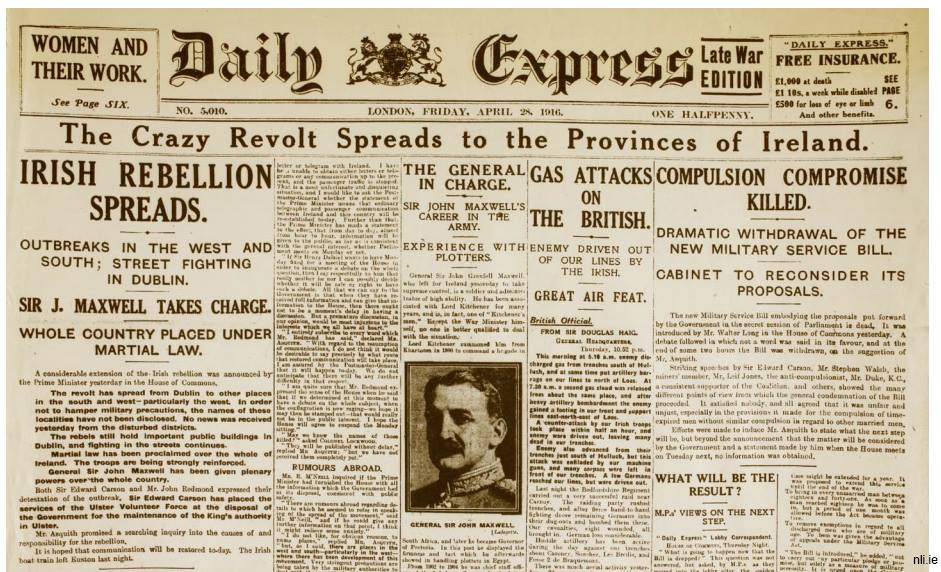Ingresa o regístrate acá para seguir este blog.
@radiobrendan
We are, as it’s said, shaped by our history; and certain past experiences define us more than others. This year, Ireland is gearing up to commemorate the centenaries of a couple of such ‘game-changing’ events. In general, they are viewed as symbolising two distinct Irelands.

How London’s Daily Express reported Ireland’s 1916 Easter Rising (from Facebook).
One, the more localised 1916 Easter Rising, a rather small, violent occurrence at the actual time organised by a group of Irishmen trying to forcibly remove the island from the British Empire, shaking off the shackles of colonial oppression. The other, World War One’s Battle of the Somme, a more international event obviously enough, where thousands of Irishmen lost their lives fighting for that same British Empire, one that many of those slain soldiers felt was worth fighting for and not against.
As contemporary discourse continues to highlight, arguments can be made for and against both outlooks. And as the make-up of today’s Ireland shows, the two ‘factions’ still exist, with pretty strong support, too.
Both events will be remembered with perhaps not so much pomp but a good dollop of ceremony on the whole island; a noble act honouring the sacrifices made and risks taken by these people in that tumultuous year you might say.
Yet, as is often the case, the aspired outcomes that made these people do what they did at that time were not realised. What’s more, especially in the case of the Somme and World War One, we saw it all over again and on a greater scale just a couple of decades later.
For the leaders of the 1916 Rising, an all-island Irish republic hasn’t been achieved. In fact, an upshot of their actions was to further deepen the divide and suspicion between the predominantly British nationalist/Protestant north-east and the Irish nationalist/Catholic leaning rest. While the dream of a united, independent Ireland outside of the British Empire, won by peaceful, political means, wasn’t really a runner at that time, the military/guerrilla approach did much to seal the two-state solution.
Indeed, Irish nationalists in Ireland’s north-east surely find it difficult to see the rising as the catalyst event that eventually led to an improvement in all-round conditions, an old proud race regaining control of their own destiny. No, their time was to come much later in the century.
Also, those thousands of Irish nationalists from Catholic strongholds who fought at the Somme, for the lucky ones who returned, they came back to a country that largely ignored their sacrifices. New Irish heroes had been made, or were in the process of being made — the Easter Rising saw to that. To have shown loyalty to and solidarity with the British cause in the hope of future political concessions found very little credence in post-1916 Ireland.

Where many of those who fought in the Battle of the Somme ended up (photo from history.com).
On the contrary, the island colleagues of those Irish nationalists who fought at the Somme, the 36th (Ulster) Division, did see some initial reward, indirectly as it may have been, for their ‘blood sacrifice’ in the proceeding years. The creation of the official territory of Northern Ireland, very much part of the union with Great Britain and the Empire, allowed, more or less, for the establishment of, in the words of its first Prime Minister Lord Craigavon, ‘a Protestant parliament and a Protestant state‘, a counterpoint to what was happening in the south.
Yet, on a greater scale, the end of World War One could be seen as marking the beginning of the end of the British Empire and a once ‘great’ Britain. Nothing would ever be the same again, the world had entered a new phase.
As we look back now, 100 years on from these era-defining moments, as the commemorations planned show, they still very much resonate on the island of Ireland. And its political shape, you could argue, whichever side you come from, resembles what the men and women of 1916 would have imagined it to be in years to come.
Two fairly distinct states exist. Northern Ireland remains very much part of the United Kingdom — albeit and thankfully much less sectarian and more democratic than it was in its early years. What is now the Republic of Ireland is pretty much as good as it could have been, territorially speaking if nothing else, for those who fought and died for it.
Yet the divisions among Irish people that the Battle of the Somme and the Easter Rising represent are, on a day-to-day basis anyway, much weaker now than at any other time since. Whatever about the past and its significance today, it’s a case of finding that mutual respect and understanding in the present time.
______________________________________________
Facebook: Wrong Way Corrigan – The Blog & IQuiz “The Bogotá Pub Quiz”.



Great article, is very complex to define human tought’s even when people have the same root’s.
- Me gusta
0
- No me gusta
0
ReportarCalifica:
Cheers. There’s a lot of history involved, like you have in many places. But as I write, well it can be good to remember the past, we must live in the present.
- Me gusta
0
- No me gusta
0
ReportarCalifica: